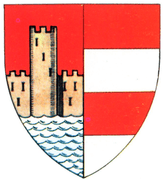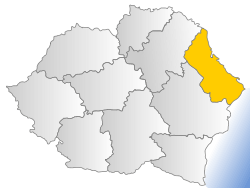Ținutul Nistru
Ținutul Nistru was one of the ten ținuturi ("lands") of Romania, founded in 1938 after King Carol II initiated an institutional reform by modifying the 1923 Constitution and the law of territorial administration. It comprised most of Bessarabia (including parts of the Budjak), and its name was derived from the Dniester River. Its capital was the city of Chișinău. Ținutul Nistru ceased to exist following the territorial losses of Romania to the Soviet Union in June 1940.
Ținutul Nistru | |
|---|---|
Land (Ținut) | |
 Coat of arms | |
 | |
| Country | |
| Former counties included | Cetatea-Albă County, Lăpușna County, Orhei County, Tighina County |
| Historic region | Moldavia (Bessarabia, Budjak) |
| Capital city (Reședință de ținut) | Chișinău |
| Established | The administrative reform of 1938 |
| Ceased to exist | Territorial loss and new administrative law (26–28 June 1940) |
| Government | |
| • Type | Rezident Regal |
| Time zone | UTC+2 (EET) |
| • Summer (DST) | UTC+3 (EEST) |
Coat of arms
The Coat of Arms is party per pale. The dexter consists of a gules field bearing an argent castle (probably depicting the citadel of Cetatea Albă) over waves argent and azure (standing for either the Black Sea or the Dniester). The sinister field consists of four bars, two of gules and two of argent, the former four counties of Greater Romania (71 in total) which it included.
Former counties incorporated
After the 1938 Administrative and Constitutional Reform, the older 71 counties lost their authority.
- Cetatea-Albă County
- Lăpușna County
- Orhei County
- Tighina County
See also
- Historical administrative divisions of Romania
- History of Moldova
- History of Romania